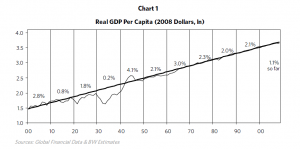European debt-crisis issues are lessons for the US. They belong in the political debate. Both political parties are responsible for our growing debt issues. Bush ran up huge deficits. Obama continued them. Each party blames the other. See the whole post here: Back from Paris
Especially pay attention to item #4. that begins: Private holders of Greek debt had several years to get out…

For extra credit from ‘The Only Thing New In History’ department: Yet another sovereign debt crisis If that link no longer works use this one to see the PDF.
The bullet points:
- Having believed the myth that governments don’t default, many banks and investors will take huge losses in Europe’s sovereign debt crisis.
- The historical regularity of government defaults—more than 250 have occurred since 1800*—gives the lie to the notion that holding sovereign debt is “risk-free.”
- The sovereign debt crisis of post–World War I Europe provides highly relevant lessons for today.
*Referencing Rogoff & Reinhart’s work in “This Time Is Different”. See ‘Whodunit’ in the column to the right for this essential book.

